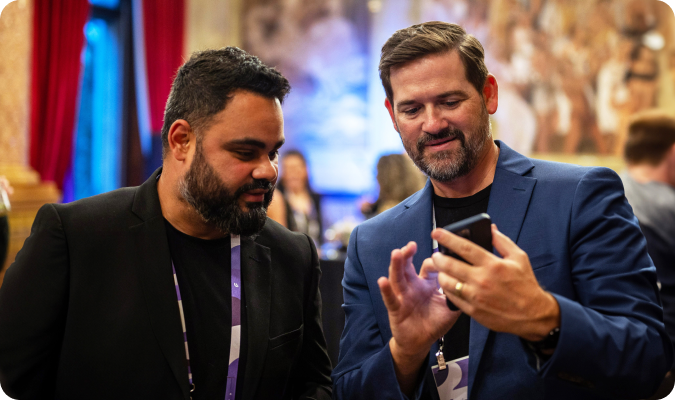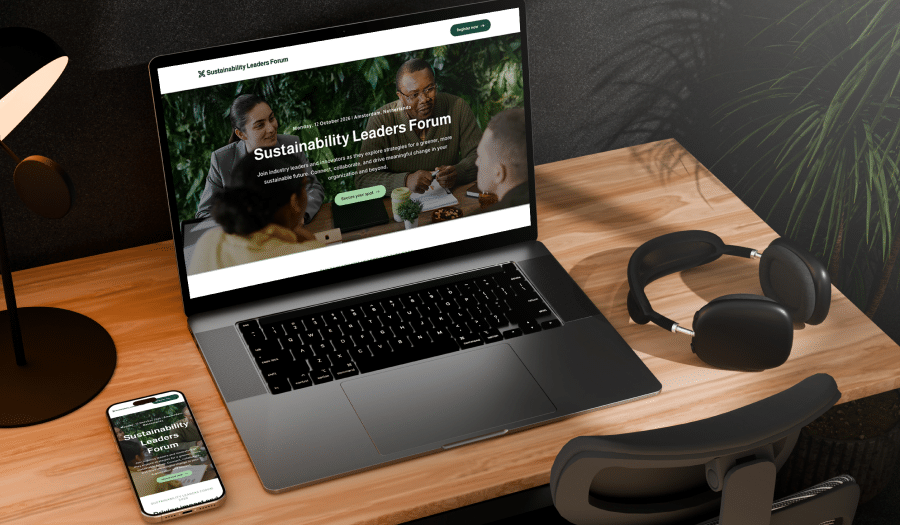
The world of electronic sports (esports) and competitive video gaming is experiencing enormous growth. In 2023, the global esports market size was valued at around US$1.72B, and is expected to grow from US$2.06B in 2024 to US$9.29B by 2032.
Event professionals have a significant opportunity to capitalize on this opportunity. Our complete guide to esports and video gaming event management will help you get started. Below, we’ll take a look at what these events are, and some practical tips if you’ve been tasked with running one.
What are esports and video gaming events?
Esports and video gaming events are organized competitions between professional players and teams. They usually play in leagues for prizes. Like other professional sports, esports teams often have owners, franchises, sponsorships and endorsements.
Esports events have exploded in popularity in the past few years, largely because most combine the popularity of video games with a social element and networking opportunities. This is true for both in-person tournament events and virtual tournament events, where features such as live streaming and chat are used to facilitate social interaction.
Now that we’ve got an understanding of the opportunity offered by esports events, let’s take a deeper look at how to deliver one.
10 tips to get started with esports and video gaming events
If you are at the beginning of your esports and video gaming event journey, it’s worth knowing that while these events may seem quite niche and specialized, they are similar in many ways to more traditional event formats (with a few key differences, which we’ll explore below).
All the traditional event management wisdom such as understanding your audience (in terms of their likes/dislikes, who inspires them, their habits, etc.) can take much of the guesswork out, and help you plan your event more effectively, so we won’t revisit all the basics here.
1. Make decisions on the game and format
It may seem fairly obvious, but your first decision will almost certainly be which game your attendees will be playing. Again, understanding your audience will help you choose the right game. As the event organizer, you don’t have to be an expert in your chosen game – but it will definitely help if you understand the basics and watch some gameplay videos on YouTube.
Once you’ve decided on your game, the next decision you need to make is around the format. For more modern video gaming tournaments, it might be a simple decision of deciding between different consoles (PC, PlayStation, Xbox or Nintendo Switch, for example).
You may even decide to go old school – fancy a Pac Man or Space Invaders tournament, anyone? In that case, you may even choose to stage the event in-person, using traditional arcade machines, with the capability to multistream the action to remote attendees.
2. Ensure venue and equipment availability
Once you’ve decided the game and the format for your esports or video gaming event, the next step is to locate the right venue and equipment availability. If you’re hosting a completely virtual tournament event, you’ll need to advise attendees of the technical requirements at their end (for example, internet connection speed). However, if you’re bringing people together in-person, things get a little trickier.
Generally, you’ll need to choose a venue that is already equipped for these sorts of events. For example, a cinema might work well, as it already has much of the AV equipment and connectivity you’ll require to run a successful esports or video gaming event.
Factors to consider will include the size of the space you’ll require, whether you need a stage or podium for the host or announcer, and access to projectors or other screens (don’t forget, this will be a critical component of most video gaming events).
Always factor in (and test!) the internet connection, power supply and security of the venue; as well as peripheral IT equipment such as consoles, PCs, controllers, headsets, microphones, cameras and speakers. To manage costs, you may be able to rent some of these items.
3. Build your audience
One key thing to know about the world of esports and video gaming is that each game tends to have very loyal followers, and its own community built around it. It can be hard to gain traction with many of these communities without doing some work at the grassroots.
If you start planning an extremely large and expensive event for a particular game, you may be setting yourself up for trouble if you haven’t first assessed how big the audience is, and how you can engage with them to market and promote your event. Some games have mass but shallow followings, while others have smaller but very loyal fandoms.
It’s also critical to consider who will be participating. Influential streamers are shaping digital entertainment, creating intriguing trends and bolstering the popularity of video games, and esports tournaments, worldwide. So, knowing exactly how popular some of your players are online, will allow you to tap into their audience too.
If you don’t already have some foundational knowledge about your chosen game, it’s always a good idea to start smaller – perhaps with a local esports event, so you can grow your audience from the ground up. This way, you’ll have a small but strong support group to grow and develop.
4. Set goals and benchmarks
When it comes to goals and benchmarks for events, the general advice is always to have them, and set them early. For more on this, visit our event reporting and analysis guide.
While goals and benchmarks are critical to every event, the esports and gaming industry has some nuances. Again, it’s critical that you understand the needs of your players and sponsors. If you’re looking to monetize your event, be aware that it can take time to build a revenue stream from gaming tournaments. The more credibility you build with your target audience, the easier this will become.
In many cases, the overarching goal of an esports event will be to build brand awareness with a particular audience – at least for a while, with the goal of making money further down the road.
Being able to measure your goals will allow you to assess how efficiently you have utilized your resources, and these results are necessary to create projections and requests for sponsorship for any subsequent events.
5. Create value and incentives
Again, just like any other event, you want to create value for your participants. The key difference is that it should be tailored to the gaming audience’s likes, dislikes and objectives.
Tournaments usually have prizes, so think carefully about what you’re going to give away. Not everyone is motivated by material goods. Grand financial prizes are obviously valuable and highly regarded, but incentives don’t always have to be monetary – they could come in the form of recognition, gift bags, access to meet and greet key figures of the industry or just the opportunity to network with other people who play the same games.
6. Focus on attendee experience
Don’t forget that providing an amazing, memorable experience for your audience is a really important way to provide value. It’s always a good idea to keep things fun and interactive, so make use of the included features of your event management solution such as quizzes, polls, games, live chat and other forms of event gamification.
Tracking attendance and behavior is another powerful tool when it comes to amping the attendee experience and providing value. With the right tools, you can enhance and streamline their event experience, offer personalized interactions and more.
If you’re looking for a quirky idea, you may even like to take some inspiration from the world of professional wrestling, telling the stories of your different players and creating hype and drama around the games!
7. Value your influencers
While you can and should be using social media to boost on-site engagement during your esports or virtual gaming event, social platforms also have a critical and unique role to play in the promotion of your event.
Most gaming communities have their own influencers, whom you can tap on the shoulder to help you spread the word about your upcoming tournament. Word-of-mouth is huge in the esports and video gaming industry, and recommendations from beloved influencers and trusted figures of the industry can go a long way.
Reach out to influencers early so that they have more lead time to build hype and anticipation for your event. Consider incentivizing their participation in drawing in the crowd and provide them with what they will need, within reason.
8. Embrace multistreaming
While many event professionals are getting their heads around event multistreaming, and whether to use it on their events, it’s a non-negotiable when it comes to esports and video gaming tournaments.
According to Emarketer.com, approximately 32 million people in the US alone watch esports via a livestream or on-demand format at least once per month. Some of the key streaming platforms include Twitch, YouTube, Facebook Gaming, Discord, Caffeine and Steam TV.
In short, if you’re not multistreaming your esports or video gaming event, you’re missing out on a large chunk of your potential audience. Always make sure this capability is included in your event planning solution. Thankfully, with EventsAir’s OnAIR platform, you can easily capture your live or virtual events and easily package these for multistreaming services.
9. Decide your key staff
When it comes to successful event planning, having the right team supporting you is always critical. This is especially true in the world of esports, when you’ll also need some specialized roles to give your event credibility, as well as the right level of energy and enthusiasm.
As always, you’ll need an experienced team to help you with the planning, setup, registration, event check-in, production, moderation and troubleshooting of your event. If budget allows, you could also consider bringing in specialized talent, such as gaming casters, analysts, hosts, commentators and entertainers.
Overall, you want people who understand esports and can keep your audience excited, engaged and entertained.
10. Don’t forget your sponsors and partners
Esports tournaments offer a unique opportunity to bring in a range of sponsors and partners from the broader gaming community. This could include the game publisher, vendors, hardware and software partners and more.
Give your potential game publishers and partners a solid reason to be a part of your event. Event sponsors usually need your event far less than you need them, so be generous with what you can offer. These partners may receive plenty of requests to sponsor esports tournaments, prizes and events all the time, and they need a good reason to say ‘yes’ to you.
Sponsorship goes beyond gift bags and prizes. For sponsors who say no to sponsoring prizes, don’t give up on them just yet – they might be interested in being a part of the event in other ways. They could be more interested in offering discount codes or special sale exclusives to your event. No matter how small their contribution is, every sponsor counts.
Track the metrics that matter with EventsAir
Events come in all shapes and sizes. Whether you’re hosting a major sporting event, or a corporate conference, or an esports tournament or a video gaming event – serious event professionals need an all-in-one event management solution that provides all the tools and technology you need to plan and execute great events, every time.
At EventsAir, we make it easy to plan your events and create broadcast-quality experiences when you need it – without going over budget. We offer a range of services to ensure your virtual event provides an engaging and seamless experience for your remote attendees. Everything from full event build and event payment processing, to managing your online sessions and comprehensive tech support.
We have one simple mission: to help event planners deliver the WOW in their events with the world’s most powerful event management technology. We’ve delivered some of the world’s biggest events, and we’d love to help you too.
If you would like to understand how we can help you take advantage of powerful event planning tools for your next gaming event then schedule a demo with one of our team members today.
Best Practice | Event Planning & Management
See EventsAir in action
Discover why 12,000+ event professionals trust EventsAir to deliver effortless events, every time.




